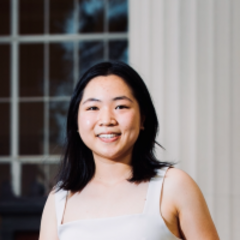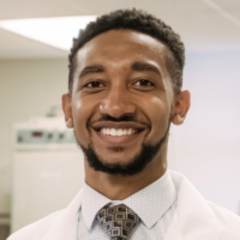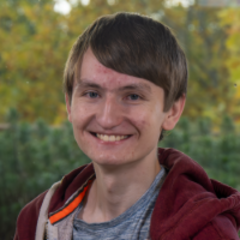Graduate Students

Amy Jin received her S.B. in Biological Engineering and Electrical Engineering & Computer Science from the Massachusetts Institute of Technology (MIT) in 2021. As an undergraduate, she worked on targeted drug delivery to the gastrointestinal tract, focusing on hydrogel-based microbial delivery. As a PhD student, Amy seeks to develop biohybrid neural implants that can form a living interface with the brain to restore function after injury.

Filip Wronowski received his BA in undergraduate Medicine and Engineering from the University of Cambridge in 2020. He is now pursuing the MB PhD course where his Clinical Medicine studies are interspersed with PhD work in Electrical Engineering. His project focuses on investigating foreign body response to neural implants and using electrical stimulation to minimize scar formation.

Stefany Kissovsky received her BEng in Electrical and Electronics Engineering, from University of Southampton, in 2020. Her final year project was based on developing a point-of-care respiratory sensor and COMSOL modelling. She undertook an internship at the CMOS Sensors Group in STFC at Harwell Oxford Centre, where she worked on X-Ray CMOS sensors. She joined the CDT in Sensor’s Technology in 2020 and worked on integrating microfluidics with neuronal cell cultures for studying Tau pathology. Her current PhD research is focused on designing, fabricating and bio-functionalising organic electrochemical transistors (OECTs) for studying cholesterol metabolism in Alzheimer's disease in collaboration with Prof. Gabriele Kaminski.

Belquis Haider is a PhD student with a mechanical engineering background triple concentration in design, mechatronics, materials, and manufacturing (BSc American University in Cairo, 2019), and an EU-commission funded photonics technologies MSc, specialised in photonics mater and ultrafast lasers (Aix-Marseille and Tampere Universities, 2020/1). During her undergraduate degree she also worked at the University of Leeds on the integration of soft tactile sensors into hand splints and established a system for data acquisition. This was a collaborative project with the University of Oxford and Imperial College London. She also had experience working in collaboration with the Leeds Teaching Hospitals to develop a soft passive rehabilitation mechanism for Brachial Plexus injured patients. During her master’s degree, her experience involved fabricating photoresponsive liquid crystal networks and designing, synthesising, and testing DNA nanostructures to enhance a super-resolution microscopy technique (DNA-PAINT) in Tampere and Cambridge. The focus of her PhD research is on developing a platform to study neurodegenerative disease - integrating technologies such as microfluidics, optogenetics, microelectrode arrays, and super-resolution microscopy working in collaboration with Prof. Gabriele Kaminski.

Ruben Ruiz-Mateos Serrano is a PhD student at the University of Cambridge and part of the joint Cambridge/UCL Connected Electronics and Photonics CDT program. He received his MEng in Biomedical Engineering from Imperial College London (2021) where he was supervised by Prof. Emmanuel Drakakis. His final year masters project focused on the design of neuromorphic biomimetic circuits which replicate the exact dynamics of the Nobel Prize winning Hodgkin Huxley equations on neuronal dynamics by means of ultra-low-power, microelectronic integrated circuits. As part of the CDT, Ruben received a MRes from the University of Cambridge (2022) during which he worked in a joint project with Prof. Demosthenous from UCL to implement an ultra-low-power, microelectronic chip that performs analogue signal processing of photoplethysmography measurements to predict blood pressure. His interests include the design of ultra-low power microelectronic biocircuits, that is, topologies which replicate the behaviour of biological systems with very high power and area constraints. His current research involves the design and implementation of a non-invasive and portable diagnostics device for ECG imaging based on body surface potential mapping.

Luke Gatecliff is working on his PhD focusing on the development organic electrochemical transistor (OECT) based biosensors and the associated fabrication techniques to enable their use in previously inaccessible applications. He completed his integrated MEng in Engineering from the University of Cambridge in 2022, specialising in Electrical and Electronic Engineering and Bioengineering. His Master's work investigated the effects of device geometry on the performance of ion-selective OECTs.

Salim El Hadwe is a neurosurgical trainee who finished his medical education at the Aristotle University of Thessaloniki. He pursued his academic studies at the same university, where he received his master's degree in medical research methodology with an emphasis on neurosurgical clinical practice. He finished his first year of general surgery residency at the Greek state hospital in Kavala. His training in neurosurgery continued in Belgium, where he spent three years at the ERASME university hospital in Brussels and one year at the Marie-Curie hospital in Charleroi. He became a Ph.D. candidate and a clinical research associate at the Cambridge University department of clinical neurosciences. His main research interests are in neural electrode interfaces and neural bioelectronics with applications in minimally invasive spinal cord stimulation and recording spinal cord activity in physiologic and traumatic settings.

Margaux Forner is a PhD student with background in Microelectronics and Computer Science. She studied maths, physics and engineering in undergrad part I at lycée Saint-Louis, Paris, and did part II at the Ecole des Mines de Saint-Etienne (EMSE). She pursued an integrated masters’ in engineering at EMSE where she specialized in Microelectronics and Computer Science (MEng) and a double diploma at the University of Cambridge (MPhil) in the Bioelectronics laboratory. During her PhD, she is working on biohybrid neural implants for functional restoration after a traumatic injury.

Christopher Slaughter is an Engineering PhD Student at the University of Cambridge and a member of the 2023 cohort of the Gates-Cambridge Scholars. He earned his B.S. in Computer Engineering from the University of Maryland, Baltimore County (UMBC). During his undergraduate studies, Slaughter conducted research on the development of a non-invasive glucose biosensing platform at the Center for Advanced Sensor Technology (CAST). Additionally, he worked with the Tufts University Machine Learning Group on using functional near-infrared spectroscopy (fNIRS) data to develop classifiers for mental workload. Currently, as a PhD Student, his research is focused on developing wearable technologies for the early diagnosis of neuromuscular disease.

Andrew Setley is a PhD candidate in Engineering (Churchill College) and the recipient of the Cambridge International & Churchill Pochobradsky Scholarship. His research within the Malliaras Group centers on the development of thin-film polymer-based bioelectronics for addressing spinal cord injury, with specific focus on improving durability and longevity of devices, as well as the adaptation of existing devices for human use. Prior to attending Cambridge, Andrew obtained his Bachelor’s of Science in Materials Science and Engineering from the University of Washington, Seattle, and his Master’s of Science in Materials Science and Engineering from the Georgia Institute of Technology. While at the Georgia Institute of Technology, he was a member of SPECS (the Center for Soft PhotoElectroChemical Systems). He also worked in a research and development role for four years at Crane Currency, a global provider of banknotes and anti-counterfeiting technologies. Outside of work, Andrew enjoys cooking, hiking, boxing, baseball, and traveling with his wife and Welsh Terrier.

Leon Brindley grew up in the West Midlands before studying an MEng in Electronic Engineering with Computer Systems at the University of Southampton. During the final year of this degree, he completed a Group Design Project on fabricating and testing PEDOT:PSS organic electrochemical transistors (OECTs) for digital logic circuits. He then started an MRes + PhD in Sensor Technologies and Applications at the University of Cambridge. In the Bioelectronics Group, he works on manufacturing high-quality sensors using organic mixed ionic-electronic conductors (OMIECs). His PhD is also co-supervised by Professor Henning Sirringhaus of the Microelectronics Group. In his free time, Leon likes playing football and joining in with the Cambridge University Scout and Guide Club (CUSAGC) and Gonville and Caius College's MCR.

Sydney Swedick is a Clinical Neurosciences PhD student at the University of Cambridge and recipient of the 2024 Gates-Cambridge Scholarship. She earned her B.S. in Biomedical Engineering from the University at Buffalo, New York. During her undergraduate studies, she conducted research at Johns Hopkins University as an Amgen Scholar, Harvard Medical School as a Harvard Equitable Access to Research Training (HEART) Scholar, the Wyss Institute for Biologically Inspired Engineering, along with at her universities. Her research projects spanned from developmental neuroscience to regenerative medicine for aging, to 3D printed neurovascular aneurysm models with computational fluid dynamics simulations, and organ-on-a-chip models. During her PhD, she will be focusing on utilizing flexible electronics and tissue to restore sensory perception after peripheral nerve injuries.
Erica Olsen is a PhD student in Engineering at the University of Cambridge, with a focus on life science applications. She holds a B.S. in Bioengineering (Stanford University '21) and an M.S. in Biomedical Informatics (Stanford University School of Medicine '22). During her studies at Stanford, she developed a strong foundation in both computational methods and experimental protocols, specializing in the application of machine learning for diagnostics and wearable technology. She seeks to advance the ethical applications of biotechnology, particularly through innovative sensors and diagnostic tools. Currently, her PhD work focuses on developing devices for health monitoring and therapeutic interventions.

Chaeyeon Lee received her first MSc in Applied veterinary medicine from Konkuk University in South Korea in 2020, and her second MSc in animal behaviour applications for conservation from Anglia Ruskin University in 2021. She has studied in animal behaviour and welfare in experimental animals since her BSc. She has an experience as a research assistant in the in-vivo study at the department of Neurosurgery at Severance hospital in South Korea. Her work in the Bioelectronics lab involves developing prototype neural implants.
